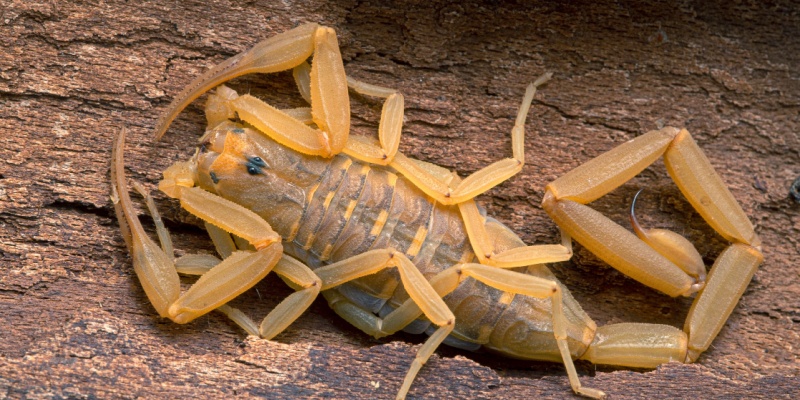Las Vegas residents often wonder why scorpions seem so abundant in our area compared to other parts of the country. The answer lies in a perfect storm of environmental factors, urban development patterns, and the remarkable adaptability of these ancient arachnids. At Pest Raiders, we've studied scorpion behavior throughout the Las Vegas Valley for years, gaining insights that help our customers better understand—and manage—these persistent desert dwellers.
Natural Desert Adaptations
Scorpions are perfectly adapted to desert environments like Las Vegas:
Extreme Temperature Tolerance
Las Vegas temperatures can swing from below freezing in winter to over 115°F in summer—conditions that would kill many creatures but barely faze scorpions:
- Cold Resistance: Scorpions produce a biological "antifreeze" that prevents their cells from rupturing in cold temperatures
- Heat Adaptation: They can withstand temperatures up to 122°F by seeking shelter and becoming nocturnal during hot periods
- Metabolic Control: Capable of slowing their metabolism to survive extreme conditions
Minimal Water Requirements
In a desert city where water conservation is crucial, scorpions' minimal hydration needs give them a significant advantage:
- Can survive on the moisture extracted from their prey alone
- Able to slow water loss through their exoskeleton
- Can survive months without additional water intake
- Highly efficient kidneys that maximize water retention
Extended Fasting Ability
While Las Vegas residents visit grocery stores regularly, scorpions can go extraordinarily long periods without food:
- Capable of slowing their metabolism to 1/3 of normal rate
- Can survive 6-12 months without feeding
- Able to consume large meals and store nutrients for extended periods
- Opportunistic feeders that can utilize various prey types
Las Vegas Urban Development Factors
Beyond natural adaptations, several aspects of Las Vegas development have inadvertently created ideal scorpion conditions:
Landscape Practices
The shift toward desert landscaping has created perfect scorpion habitat:
- Rock Xeriscaping: Decorative rock landscapes provide abundant hiding places and thermal protection
- Reduced Water Usage: Drought-tolerant landscaping often creates ideal scorpion territory
- Native Plant Selection: Desert plants often create natural scorpion habitats
Construction Factors
Las Vegas building practices can unintentionally create scorpion-friendly environments:
- Block Wall Construction: Common cinder block walls provide countless crevices for scorpions
- Stucco Exteriors: Textured stucco is easily climbed by bark scorpions
- Expansion Joints: Concrete expansion joints create perfect protected runways
- Disturbed Desert: New construction disrupts existing scorpion territories, driving them into residential areas
Irrigation Practices
Despite being desert dwellers, scorpions are attracted to moisture sources created by humans:
- Drip Irrigation: Creates localized moisture zones attractive to scorpions and their prey
- Overwatering: Excess landscape water creates humid microclimates
- Night Watering: Evening irrigation coincides with scorpion activity periods
- Water Features: Ponds and fountains attract insects that scorpions hunt
Climate Change Impacts
Recent climate trends appear to be influencing scorpion behavior in the Las Vegas Valley:
- Extended Active Seasons: Warmer spring and fall temperatures lengthen scorpion activity periods
- Changing Rainfall Patterns: More intense but less frequent rain events affect scorpion movement
- Shifting Habitat Zones: Species previously limited to southern areas are extending their range northward
- Increased Reproductive Success: Favorable conditions lead to larger broods and higher survival rates
Human Activity Influences
Our daily activities often unintentionally support scorpion populations:
- Outdoor Lighting: Attracts insects that serve as scorpion prey
- Debris Accumulation: Stored items, woodpiles, and clutter create perfect scorpion habitat
- Inadvertent Transportation: Moving landscape materials, firewood, or stored items can introduce scorpions
- Pet Food/Water: Outdoor pet resources attract insects that scorpions hunt
Reducing Scorpion-Friendly Conditions
Understanding why scorpions thrive in Las Vegas is the first step toward implementing effective control strategies:
Landscape Modifications
- Buffer Zones: Create gravel or concrete barriers between your home and desert landscaping
- Strategic Plant Selection: Choose plants less likely to harbor scorpions
- Raised Planters: Elevate garden beds to reduce ground-level harborage
- Landscape Fabric: Use weed barrier under rock landscaping to reduce hiding places
Moisture Management
- Irrigation Timing: Water early morning rather than evening
- Fix Leaks: Repair dripping faucets and irrigation system leaks promptly
- Direct Drainage: Ensure downspouts and drainage move water away from foundations
- Reduce Humidity: Ventilate crawl spaces and use dehumidifiers in damp areas
Structural Improvements
- Seal Entry Points: Close gaps around pipes, cables, and foundation cracks
- Door Sweeps: Install tight-fitting door sweeps on exterior doors
- Window Screens: Ensure all window screens are intact
- Weep Hole Protection: Install fine mesh over weep holes in block walls
- Chimney Caps: Cover chimneys and vents with fine mesh screens
Preventative Treatments
Professional scorpion control provides the most comprehensive protection:
- Targeted Barrier Treatments: Create protective zones around structures
- Regular Monitoring: Identify and address new activity quickly
- Seasonal Applications: Time treatments for maximum effectiveness
- Integrated Approach: Combine chemical and non-chemical methods
The Pest Raiders Approach to Scorpion Management
At Pest Raiders, we've developed a Las Vegas-specific scorpion control program that addresses the unique challenges of our desert environment:
- Property-Specific Assessment: Identifying the particular factors making your property attractive to scorpions
- Customized Treatment Strategy: Developing an approach tailored to your landscape, architecture, and specific scorpion species
- Environmentally Responsible Applications: Using targeted treatments that minimize impact beyond the target pests
- Ongoing Support: Providing education and follow-up to ensure continued protection
Don't resign yourself to living with scorpions as an inevitable part of Las Vegas life. Contact Pest Raiders today for a comprehensive scorpion assessment and management plan tailored specifically to your property's needs.
